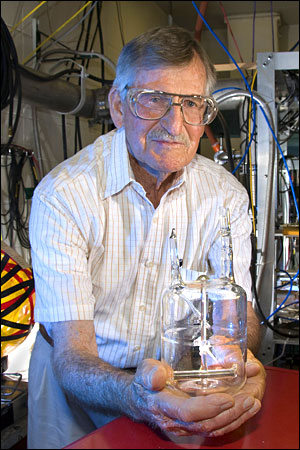Ralph Weston Jr. Named Senior Chemist Emeritus
July 7, 2008

Ralph Weston Jr.
After nearly 57 years of service at BNL, Ralph Weston Jr. has been named Senior Chemist Emeritus. Weston, widely known in the field of chemical kinetics, photochemistry, and laser spectroscopy, officially retired in 1994 but has remained active at the Lab and in the chemical physics community ever since. With his new Emeritus title, Weston has regained his BNL badge and life number along with many of the rights, privileges, and obligations of active employees.
"Weston is known by his colleagues at Brookhaven, across the country and internationally as a broadly informed, insightful member of the chemical physics community," Chemistry Department Chair Alex Harris noted. "He has made distinguished contributions to chemical kinetics and laser spectroscopy and continues to actively participate in scholarship and service since his retirement in 1994."
Weston's interest was piqued by a 1950 paper from the BNL Chemistry Department describing isotope effects in the decomposition of ammonium nitrate. Isotope effects are subtle changes in the chemical properties of elements that differ only in their nuclear mass. These effects lead to differences in chemical equilibria, and in the rates of chemical reactions-kinetic isotope effects. When Weston joined BNL's Chemistry Department in 1951, and for the following two decades, the Department was at the forefront of both experimental and theoretical research on isotope effects. Weston collaborated extensively with colleagues Jacob Bigeleisen and Max Wolfsberg. The results of these studies have led to what is now a routine use of isotope effects in deciphering the detailed mechanism of a chemical reaction.
Upon Weston's return to BNL in 1970 following a one-year sabbatical at University of California at Berkeley, his interest in chemical kinetics led him into the field of laser photochemistry. Unlike earlier methods of photochemistry in which a continuous light source provided the energy needed to break chemical bonds, lasers provide this energy in a very short pulse. This makes it possible to study reactions in real time, observing the energy distributed in products and subsequently redistributed due to molecular collisions.
In 1972, Weston co-wrote a new textbook entitled Chemical Kinetics with fellow-BNL scientist Harold Schwarz. Chemical kinetics, the study of rates and detailed mechanisms of chemical reactions, was in a period of rapid change at that time and the book by Weston and Schwarz was one of the first to take this into account. As a result, it was widely used at colleges and universities and was even translated into Spanish. "I run into lots of people who say they used the book," Weston said. "But soon after our book was published, a bunch of books with the same approach came out. So much for the royalties," he added with a smile.
Since his retirement in 1994, Weston has worked on various projects including the study of tetrafluoromethane or carbon tetrafluoride (CF4), a greenhouse gas that can be produced in the process of making aluminum from aluminum ore. He also continues computational work on isotope effects and energy transfer.
A California native, Weston received a B.S. in chemistry from the University of California at Berkley in 1946 and a Ph.D. in chemistry from Stanford University in 1949. While at BNL, Weston served the Chemistry Department in a number of roles. He was an assistant chairman from 1974 to 1979 and then assumed the role of associate chairman, which he held until 1981. He served as acting chairman for several months in 1981 and 1982 and also as deputy chairman until 1990.
Weston has also been active in the outside scientific community. He has served as an advisor and consultant to numerous committees including the National Research Council (NRC)/National Academy of Sciences (NAS) Committee Advisory to Army Research (1975-1981), NRC/NAS Committee on Chemical Kinetics (1975-1977), NRC/NAS Advisory Board for the Office of Chemistry and Chemical Technology (1980-1981), and American Chemical Society Executive Committee, Division of Physical Chemistry (1986-1989). He was a visiting scientist at Centre d'Etudes Nucleaires de Saclay in France in 1960 to 1961 and has also been a guest lecturer at Hunter College, University of California at Berkeley and Irvine, and Columbia University.
Reflecting on his experiences, Weston offered advice to both future and current scientists. "It's unfortunate that so many kids are not interested in science, and they go off into other things," he said. "My advice to them is: When you choose a career, be sure you're doing something you love to do. Don't make a decision based on what kind of paycheck you get."
2008-739 | INT/EXT | Newsroom









